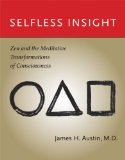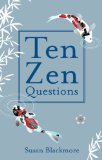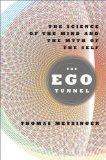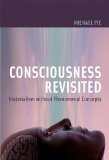
James H. Austin and Susan Blackmore, two favorite authors on consciousness, have new books out. First,
Selfless Insight: Zen and the Meditative Transformations of Consciousness by James H. Austin (MIT Press, 2009):
Product Description
When neurology researcher James Austin began Zen training, he found that his medical education was inadequate. During the past three decades, he has been at the cutting edge of both Zen and neuroscience, constantly discovering new examples of how these two large fields each illuminate the other. Now, in Selfless Insight, Austin arrives at a fresh synthesis, one that invokes the latest brain research to explain the basis for meditative states and clarifies what Zen awakening implies for our understanding of consciousness.
Austin, author of the widely read Zen and the Brain, reminds us why Zen meditation is not only mindfully attentive but evolves to become increasingly selfless and intuitive. Meditators are gradually learning how to replace over-emotionality with calm, clear, objective comprehension.
In this new book, Austin discusses how meditation trains our attention, reprogramming it toward subtle forms of awareness that are more openly mindful. He explains how our maladaptive notions of self are rooted in interactive brain functions. And he describes how, after the extraordinary, deep states of kensho-satori strike off the roots of the self, a flash of transforming insight-wisdom leads toward ways of living more harmoniously and selflessly.
Selfless Insight is the capstone to Austin’s journey both as a creative neuroscientist and as a Zen practitioner. His quest has spanned an era of unprecedented progress in brain research and has helped define the exciting new field of contemplative neuroscience.

Then Ten Zen Questions by Susan Blackmore (Oneworld Publications, 2009) :
Product Description
Who are you? When are you? What were you conscious of a moment ago? This groundbreaking book sees acclaimed psychologist Susan Blackmore combining the latest scientific theories about mind, self, and consciousness, with a lifetime’s practice of Zen.
Alongside her research on consciousness and memes, Susan Blackmore has been practising Zen for over twenty-five years; not as a Buddhist, but as a scientist who longs to understand the mind. Many neuroscientists and philosophers believe that we need first-person approaches as well as third-person scientific research in order to fully comprehend consciousness. In Ten Zen Questions, she brings the two together for the first time.
Seeking to understand whether personal experience can help penetrate the scientific mystery of consciousness, she uses traditional techniques of calming the mind and looking directly into experience as she delves into ten great questions, including “How does thought arise?”, “Am I conscious now?”, and the Zen koan “There is no time. What is memory?”
Featuring the ten questions, a critical response from her Zen master, and lively illustrations, Ten Zen Questions offers a revolutionary way to try to understand who we are. This is not the kind of book that provides final – or easy – answers, but instead offers an inspiring exploration of how intellectual enquiry and meditation can tackle the questions behind some of today’s greatest scientific mysteries.
Website for the book







